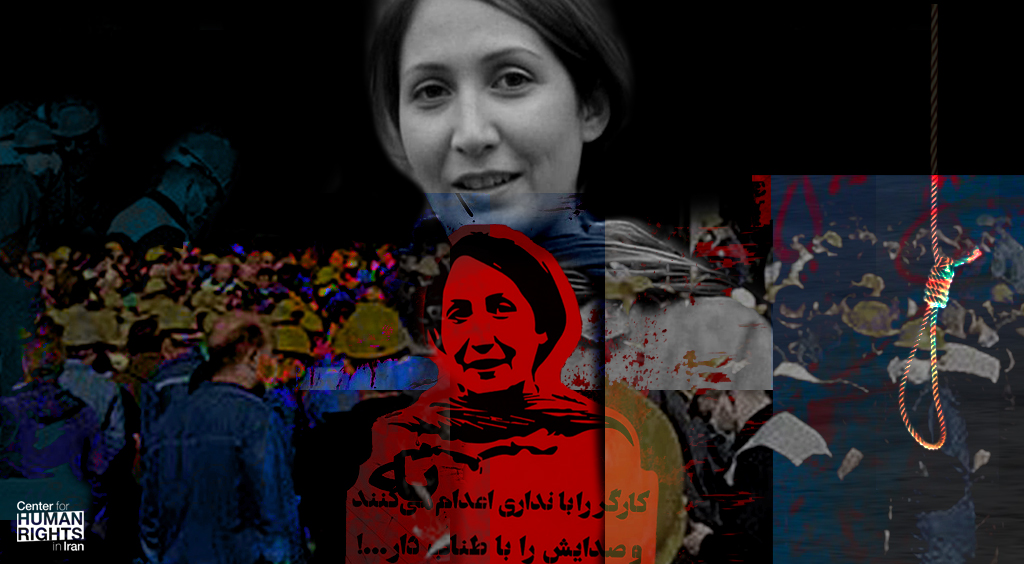Death sentence against labor activist sheds light on deadly repression in Iran

Mother of a 12-year-old was tortured and held in solitary confinement without contact with the outside world
Credible and verified evidence for fabricated allegations
July 8, 2024 – The Iranian judiciary’s death sentence on Sharifeh Mohammadi, an industrial engineer and independent trade union activist, based on bogus charges, underscores the growing state repression in Iran that is both deadly and unlawful.
The death sentence against Mohammadi was imposed on the basis of alleged links to organizations of which she was not even a member, she said.
“Another woman has been sentenced to death just as Iran’s new president was elected, showing that the Islamic Republic has no intention of stopping its state-sponsored killing machine, which will continue to be used to punish and silence peaceful dissidents,” said Hadi Ghaemi, executive director of the Center for Human Rights in Iran (CHRI).
“The Sharifeh case highlights what Iranian labor activists and indeed every independent member of civil society have suffered for decades: deadly repression when they demand basic rights,” said Ghaemi.
CHRI calls on the international community to demand that the Iranian authorities:
- Immediately revoke the death sentence against Sharifeh Mohammadi.
- Stop the imposition and execution of all death sentences, as systematic violations of fundamental rights and due process are commonplace in the use of the death penalty in the Islamic Republic.
- They must comply with their obligations under Iranian and international law and respect peaceful protest and independent workers’ activism.
On July 4, 2024, Branch 1 of the Islamic Revolutionary Court in Rasht, presided over by Judge Ahmad Darvish Goftar, imposed a death sentence on Mohammadi, a 45-year-old industrial design engineer and married mother of a 12-year-old son. She had been arrested by agents of the Ministry of Intelligence in December 2023 and held incommunicado for months while her family was denied any information about her status or whereabouts. The lower court’s verdict is expected to be appealed by Mohammadi’s lawyer.
Mohammadi’s aunt, Vida Mohammadi, told RFE/RL’s Radio Farda that Sharifeh Mohammadi was tortured in prison after her arrest on December 5, 2023, and spent several months in solitary confinement.
Both the Ministry of Intelligence, which reports to the Iranian president, and the Islamic Revolutionary Guard Corps (IRGC) intelligence agency, which reports directly to Supreme Leader Ali Khamenei, have a long and well-documented history of collaborating with Iran’s Islamic Revolutionary Court, using national security-related charges to punish and suppress peaceful protests.
Mohammadi’s husband, Siros Fathi, was also arrested by agents of the Ministry of Intelligence on June 11, 2024, after requesting information about his wife’s case. He was released on bail later that month.
Union confirms that Mohammadi is not even a member
The court said Mohammadi was convicted of “armed rebellion against the state.” Evidence presented included her alleged membership of the national Labor Unions Assistance Coordination Committee (LUACC), which operates legally in Iran, and her alleged membership of the banned Komala Party of Iranian Kurdistan.
Mohammadi and her family vehemently deny her membership in either organisation, pointing out that she was never a member of Komala and has not been a member of LUACC for ten years.
“If being a member of the LUACC is an act of rebellion, then come and arrest us too, because we too were once members of the committee,” Mahmoud Salehi, a former LUACC board member, said in an Instagram post on June 28, strongly denying the allegations against Mohammadi.
The Labor Unions Assistance Coordination Committee (LUACC) was founded in Iran in the early 2000s by a group of prominent labor rights activists. Its main goals included empowering workers by helping them organize, raising awareness of labor laws, and eliminating child labor.
The “Campaign for the Defense of Sharifeh Mohammadi” described the LUACC as legal, but added that it had not been a member for ten years anyway.
The campaign described the court ruling against them as “medieval and criminal.”
“Many believe that this ridiculous and baseless verdict was only made to create an atmosphere of fear and intimidation among activists in Gilan (province),” the group said.
The Islamic Republic’s violent repression was particularly pronounced – and deadly – in Iran’s minority-dominated regions.
Iran is a member of the International Labour Organization, whose fundamental principles guarantee the right to independent organisation, collective bargaining and strikes.
The country is also a signatory to the International Covenant on Civil and Political Rights (ICCPR), which provides for freedom of association and guarantees the right to form trade unions in Articles 21 and 22. The country is also a signatory to the International Covenant on Economic, Social and Cultural Rights (ICESCR), which guarantees the right of workers to form or join trade unions and protects their right to strike in Article 8.
Yet peaceful advocacy for workers’ rights is treated as a breach of national security, independent unions are not recognized, strikers are often fired and risk arrest, and union leaders are prosecuted on general national security charges and sentenced to long prison terms.
Mohammadi’s verdict follows three months of increasing state repression against labor rights activists, whose demands have mainly centered on demanding unpaid or living wages. During this period, activists have been summoned to court and charged with national security offenses. In addition, those on sick leave have been forced to return to prison without receiving adequate treatment.
“Sharifeh is the latest victim of the Islamic Republic of Iran’s well-functioning system of repression,” Ghaemi said. “The Ministry of Intelligence, the IRGC and the judicial system all play a committed and coordinated role in eradicating any form of peaceful resistance, real or imagined, under the guise of a corrupt judicial system.”


